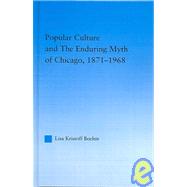- ISBN: 9780415949293 | 0415949297
- Cover: Hardcover
- Copyright: 6/30/2004
Contemporary urban historians increasingly seek to address the roles played by cities in national cultures and to explore ways in which these roles are constructed and changed. This work traces the evolution of Chicago's national reputation between the years of the Great Chicago Fire of 1871 and the Democratic National Convention, held in Chicago, in 1968. Chicago's popular image grew out of a debate waged by cultural producers-including journalists, creative writers, and film and television producers-who tended to portray the city as an image of progress. Despite the concerted efforts of the boosters, the images of Chicago concocted by the cultural producers proved more tenacious, resonating with an American audience primed to view urban places as challenges to American morality. Over time, an enduring and sordid picture of the city arose, a myth that cast Chicago as the "infamous city". Using a wide array of popular media, the book examines the reputation of Chicago as represented at the mostmainstream level of American culture. The work contrasts the cultural producers' and the boosters' relative abilities to bring their views of Chicago to American audiences. However even the world's fairs, the booster's most extravagant tools, proved little match for the cultural producers' access to American culture. Chicago's dark image took root in the American consciousness until the violence that disrupted many U.S. cities in the 1960s unearthed challengers for Chicago's anti-urban title. In an age in which urban areas are often assumed to equate with such problems as infrastructure decay, drug abuse, and racism, it become increasingly apparent that the way in which we think about cities is very important. This project fills historiographical gaps with its assertion that understanding the evolution of the reputation of Chicago is an integral part in comprehending both the history of this city and American views of all urban places. This story has value not only for what it uncovers about thisspecific city but what it tell us about cities in general, and Americans' beliefs about themselves.






